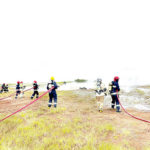The latest development may not be unconnected with the ongoing plan by the Federal Government to concession the four international airports across the country.
The four airports in question are the Murtala Muhammed Internatuinal Airport, Lagos, the Nnamdi Azikwe International Airport, Abuja, Malam Aminu Kano International Airport and Port Harcourt International Airport.
Though since the government through the minister of state for aviation declared the intention to concession the four international airports, there have been different reactions with a group opposing it due to what they called unpalatable experience in similar projects earlier executed which did not go well.
Other group who has been making case for the concession attributed their reasons to what they called wind of change blowing across the world, which is greatly taking the stress of doing business off the shoulders of governments coupled with the economic challenges confronting different nations including the Nigerian government.
Besides these excuses, those who are backing the concession plans have argued that the concession/ privatisation of the airports will make them more effective and efficient and subsequently generate more funds to the coffers of government if allowed to be run by private investors.
While those who are against the deal are right to a great length, but one obvious thing is that the present economic predicament has made it almost impossible for the government to continue to manage the international airports in particular in view of the huge fortunes required to make them effective.
No wonder, the airports across the country are faced with myriad of challenges ranging from infrastructural deficits to lack of financial capacity needed to make them compete favourable with standard airports.
It is no longer news that the burden of managing the over 22 airports across the country has been solely heaped on the shoulder of the Federal Airports Authority of Nigeria (FAAN).
Though the management of FAAN has not complained, but for sure, the authority is struggling to continue with this responsibility owing to the hash economic situation made worsened by the hostile business environment.
Many are equally pessimistic about the concession based on the outstanding controversial ones earlier executed which have created wrong impression on the act of doing business between government and the private investors.
Among such controversial concessions include the one between FAAN/Bi-Courtney Aviation Services, managers of MMA2, the one between Maevis/FAAN and the one between FAAN/AIC to mention but a few.
A source close to the meeting told our correspondent that top on the list of concessions mentioned for review are that of the Bi-Courtney Aviation Services Limited (BASL), operators of the Murtala Muhammed Airport Two (MMA2), the one involving Avitech Nigeria Limited, which is in charge of revenue collection for FAAN at the Murtala Muhammed Airport, the one between FAAN/ Pan Express Nigeria Limited and Promo World to mention but a few.
Absolutely, it may become almost impossible for government to succeed in the planned concessioning if the controversial ones are left unresolved due to fear of the unknown.
It is therefore cheering to hear that the minister has directed FAAN to look into these controversial deals for the purpose of reaching a compromise on all sides.
The need to resolve the troubled deals becomes imperative in view of the fear already created in the minds of private investors both from within and outside Nigeria about investment.
Obviously, if FAAN is able to resolve these controversial deals, both foreign and private investors will be willing to take the risk of doing business in the sector and other sectors of the economy.
It is under this atmosphere that credible investors will be willing to buy into the planned concession of the airports and the plan to float a new national airline which will give room for transparent and competitive bidding and the emergence of credible and renown investors who will come around to turn around the fortunes of the airports.






